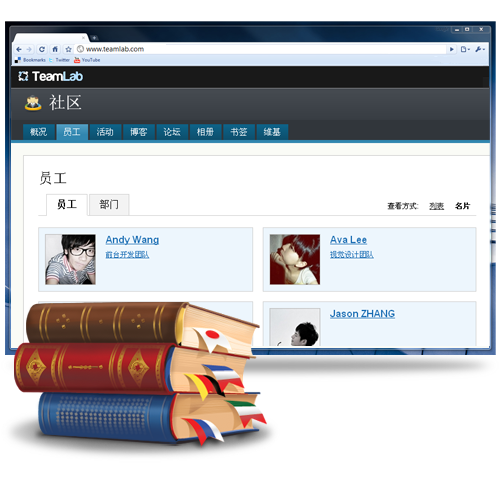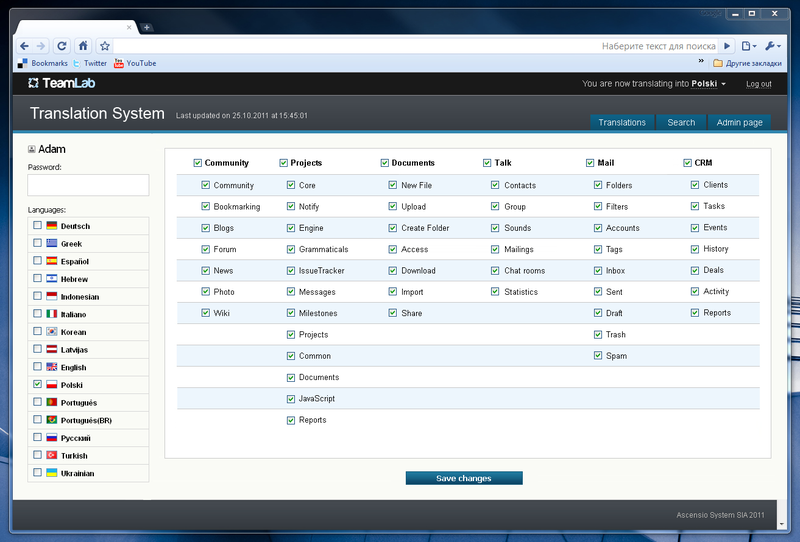Let me speak from my heart or TOT most TeamLab
Summer 2010 - TeamLab is available in 5 languages: English, Spanish, German, French and Russian. Autumn 2011 - already fluent in 10 languages: added Italian, Latvian, Greek, Turkish, and partially Portuguese. Very soon, TeamLab will “speak” in Polish, Chinese and Czech, as well as fully “learn” two versions of the Portuguese language, and a little later we hope that we will “hear” it in Ukrainian, Swedish, Korean and even Indonesian. As language steel is tempered, we will learn in this post from the mouth of not only our developers, but also specialists from the technical writers department.

A bit of history
At first, it was awkward to translate TeamLab to technical writers involved in the project. The work was carried out with the help of the self-developed open source Resource Blender .NET solution. Translators could not see the result of their work right away, as it was required to rebuild all the projects and deploy the entire infrastructure on the test server. In addition, at a certain point, about 500 resx files have accumulated in different languages, and there was no longer any trouble with them. Because of all this mass of inconvenience, this decision had to be abandoned and set about creating its own system.
A word to the developers of TeamLab Online Translation System
')
The TeamLab Online Translation (TOT) system consists of two parts: the Front-End website is an ASP.NET MVC2 application with an AJAX interface for translators and the DBResourceManager is a self-writing .NET resource manager, which we replace with the original System.Reflection. Data is stored in two databases: for translators and production.
TOT functionality can be divided into
opportunities for translators:
- operational preview of the translation;
- quick search for the necessary resource keys;
- automatic translation: variants of the embedded Google Translator and other users of the system;
- adding comments to the default language (in our case, to English).

features for administrators:
- administer user accounts and add new languages;
- limiting the access rights of translators to work in certain modules;
- viewing statistics on the language / module / project translation in percent;
- disabling, if necessary, of some modules or projects, for example, those that are currently not necessary to translate.

A word to technical writers TeamLab
According to our statistics, 38 translators have worked with TeamLab. These are our technical writers and, of course, volunteers from around the world who have been collaborating with us for more than six months. Every week we receive letters from our potential translators. Some enter the system only once, others slowly but surely translate a few words a day, and then disappear, and only the most persistent remain with us to the end. Those who are not afraid of the volume of work.
A small example: one of the translators promised to do everything in a couple of days, and in a couple of weeks he admitted: “We have already translated the projects and we still have the rest. To be honest is really hard job ... ". As a result, it took him more than a month to translate. About the most persistent you can read on our site .
Both for ourselves and for our assistants from all over the world, the translation process would not have been so convenient, if not our internal development - the TOT System.
The main advantages of the system in our opinion :
Online translation
You no longer need to install additional software, as it was before when translating .xml, .sil or .resx files. Just enter the address of the system in the address bar and you can start working.
Responsiveness
We translate the word, click on the portal link, open the corresponding portal page and see the changes. No need to wait for anything. Transfers are updated in real time.
Easy to use
We move from key to key with a simple mouse click, translate and save. No unnecessary movements. No extra buttons. The only one available is Save .
Assistants
Need helpers? Google translator, translations of other users of the system, filters and search significantly simplify and speed up the translation process.
A word to overseas translators
The Teamlab ResxEditor, but it is complicated. So you can translate your online translation system. Jason ZHANG (Chinese)
Google transate suggestion is just great! Jip Jonker (Dutch)
I have started translating.
... it works perfectly ...
Tomáš Kapler (Czech)
Instead Shl
In English, there is the concept of eating your own dog food , which means the company uses its own products. The goals of this approach are clear: and instill confidence in our consumers that the product is really worth it, since we also use it, and test everything ourselves in great detail for all kinds of bugs and inconveniences. Critics believe that dogfooding has some drawbacks: product developers can do as convenient for them, but this does not necessarily mean convenient for a wide range of users. As it is known to regular users, the TeamLab team also does not hesitate to use its own service and actively uses it, but at the same time we don’t have to fear for usability: not only programmers, but also representatives of other professions and other mindsets, including humanitarian, work on the project. The TOT system is an example of the fact that even a product for domestic consumption is not made in the way that developers would see it, but is entirely focused on the user experience, in this case translators and technical writers, whose opinion was taken into account at all stages of development.

A bit of history
At first, it was awkward to translate TeamLab to technical writers involved in the project. The work was carried out with the help of the self-developed open source Resource Blender .NET solution. Translators could not see the result of their work right away, as it was required to rebuild all the projects and deploy the entire infrastructure on the test server. In addition, at a certain point, about 500 resx files have accumulated in different languages, and there was no longer any trouble with them. Because of all this mass of inconvenience, this decision had to be abandoned and set about creating its own system.
A word to the developers of TeamLab Online Translation System
')
The TeamLab Online Translation (TOT) system consists of two parts: the Front-End website is an ASP.NET MVC2 application with an AJAX interface for translators and the DBResourceManager is a self-writing .NET resource manager, which we replace with the original System.Reflection. Data is stored in two databases: for translators and production.
TOT functionality can be divided into
opportunities for translators:
- operational preview of the translation;
- quick search for the necessary resource keys;
- automatic translation: variants of the embedded Google Translator and other users of the system;
- adding comments to the default language (in our case, to English).

features for administrators:
- administer user accounts and add new languages;
- limiting the access rights of translators to work in certain modules;
- viewing statistics on the language / module / project translation in percent;
- disabling, if necessary, of some modules or projects, for example, those that are currently not necessary to translate.

A word to technical writers TeamLab
According to our statistics, 38 translators have worked with TeamLab. These are our technical writers and, of course, volunteers from around the world who have been collaborating with us for more than six months. Every week we receive letters from our potential translators. Some enter the system only once, others slowly but surely translate a few words a day, and then disappear, and only the most persistent remain with us to the end. Those who are not afraid of the volume of work.
A small example: one of the translators promised to do everything in a couple of days, and in a couple of weeks he admitted: “We have already translated the projects and we still have the rest. To be honest is really hard job ... ". As a result, it took him more than a month to translate. About the most persistent you can read on our site .
Both for ourselves and for our assistants from all over the world, the translation process would not have been so convenient, if not our internal development - the TOT System.
The main advantages of the system in our opinion :
Online translation
You no longer need to install additional software, as it was before when translating .xml, .sil or .resx files. Just enter the address of the system in the address bar and you can start working.
Responsiveness
We translate the word, click on the portal link, open the corresponding portal page and see the changes. No need to wait for anything. Transfers are updated in real time.
Easy to use
We move from key to key with a simple mouse click, translate and save. No unnecessary movements. No extra buttons. The only one available is Save .
Assistants
Need helpers? Google translator, translations of other users of the system, filters and search significantly simplify and speed up the translation process.
A word to overseas translators
The Teamlab ResxEditor, but it is complicated. So you can translate your online translation system. Jason ZHANG (Chinese)
Google transate suggestion is just great! Jip Jonker (Dutch)
I have started translating.
... it works perfectly ...
Tomáš Kapler (Czech)
Instead Shl
In English, there is the concept of eating your own dog food , which means the company uses its own products. The goals of this approach are clear: and instill confidence in our consumers that the product is really worth it, since we also use it, and test everything ourselves in great detail for all kinds of bugs and inconveniences. Critics believe that dogfooding has some drawbacks: product developers can do as convenient for them, but this does not necessarily mean convenient for a wide range of users. As it is known to regular users, the TeamLab team also does not hesitate to use its own service and actively uses it, but at the same time we don’t have to fear for usability: not only programmers, but also representatives of other professions and other mindsets, including humanitarian, work on the project. The TOT system is an example of the fact that even a product for domestic consumption is not made in the way that developers would see it, but is entirely focused on the user experience, in this case translators and technical writers, whose opinion was taken into account at all stages of development.
Source: https://habr.com/ru/post/133296/
All Articles